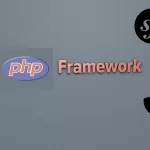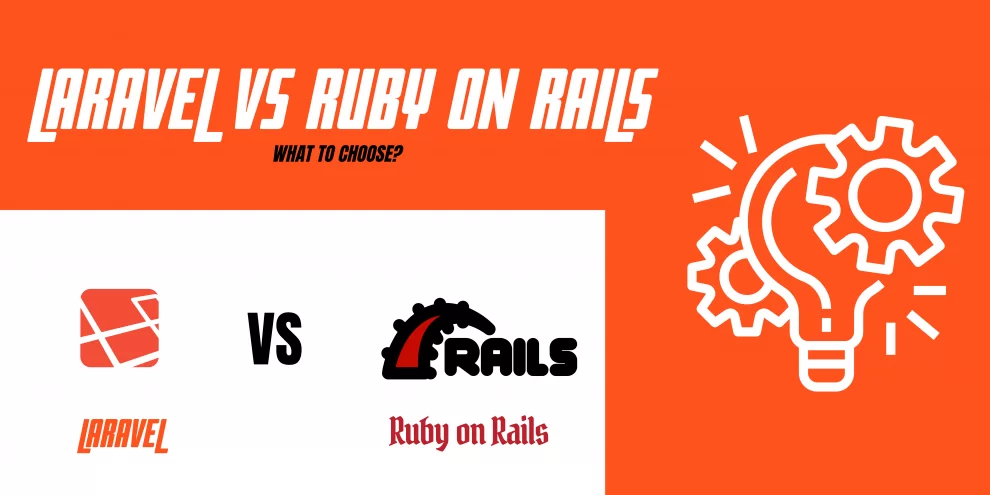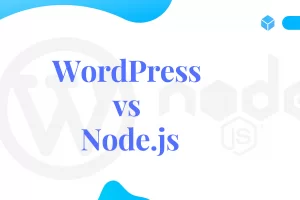In the vast and dynamic landscape of web development, the choice of a framework, such as in the Laravel vs Ruby on Rails comparison, can be likened to selecting the right set of tools for a craftsman. It shapes the trajectory of our project, affecting its efficiency, scalability, and overall success. Today, we embark on a thorough comparison between these two prominent frameworks—Laravel and Ruby on Rails. This comparative analysis aims to shed light on the unique strengths and weaknesses that define each framework.
Both Laravel and Ruby on Rails hold a prominent position in the realm of web development, each offering a suite of distinctive features and advantages. By conducting a deep dive into this Laravel vs Ruby on Rails comparison, we aspire to provide you with valuable insights that will aid you in making an educated decision for your upcoming web development endeavor. Let us navigate this exploration and uncover the distinguishing characteristics that set these leading frameworks apart.
What is Laravel?
Laravel is a popular open-source PHP web application framework known for its elegant syntax and developer-friendly environment. It provides a robust set of tools and features that simplify and streamline the web development process. Laravel follows the Model-View-Controller (MVC) architectural pattern, offering a clean and organized structure for building scalable and maintainable applications. With features like built-in authentication, database migrations, routing, and powerful templating engine called Blade, Laravel enables developers to create dynamic, feature-rich web applications efficiently. It also has a thriving community and comprehensive documentation, making it accessible to developers at various skill levels.
In essence, Laravel empowers developers to focus on application logic and functionality, allowing for rapid development and delivering high-quality, modern web applications. Its versatility and wide range of features make it a preferred choice for building everything from simple websites to complex enterprise-level applications.
Why use Laravel?
Laravel is a preferred framework in web development due to its exceptional blend of simplicity, flexibility, and robust features. Its elegant syntax and developer-friendly nature significantly reduce the learning curve for newcomers, making it accessible to a broader audience. With built-in functionalities like authentication, authorization, and object-relational mapping (ORM), developers can expedite the development process and deliver high-quality applications swiftly. Moreover, Laravel’s extensive ecosystem boasts a multitude of packages and extensions through Composer, providing solutions for a wide range of functionalities without the need to reinvent the wheel. This vibrant community and ecosystem ensure developers have the necessary tools and support to tackle various projects efficiently.
One of Laravel’s standout features is its emphasis on modern development practices such as MVC (Model-View-Controller) architecture and object-oriented programming. This promotes a structured and organized approach to development, enhancing code maintainability and scalability. Laravel also offers seamless integration with front-end frameworks and libraries like Vue.js and React, allowing for the development of interactive and engaging user interfaces. Overall, Laravel’s balance of simplicity, productivity, and adaptability positions it as an ideal choice for developers and businesses seeking a robust framework for building scalable, high-performance web applications.
Also Read: Node.js vs Golang: What to Choose?
What is Ruby on Rails?
Ruby on Rails, often referred to as Rails, is a powerful open-source web application framework written in Ruby programming language. It is renowned for its emphasis on convention over configuration and follows the “Don’t Repeat Yourself” (DRY) principle, streamlining development and minimizing redundancy. Ruby on Rails provides a rich set of pre-built tools, libraries, and modules that expedite the development process, enabling developers to build feature-rich applications rapidly. The framework’s MVC (Model-View-Controller) architecture ensures a well-organized codebase, separating data management, user interface, and control flow for easier maintenance and scalability. Additionally, Rails has a vibrant community and an extensive ecosystem of gems (libraries) that further enhance its capabilities and provide solutions for a wide range of functionalities.
Ruby on Rails is well-suited for developing a variety of web applications, from social networking platforms and e-commerce websites to content management systems and more. Its versatility, along with its focus on developer productivity and maintainability, makes it a popular choice among both experienced and novice developers. With its ability to handle complex tasks efficiently and promote efficient coding practices, Ruby on Rails stands as a robust framework for building scalable and high-quality web applications.
Why use Ruby on Rails?
Ruby on Rails, often referred to as Rails, is a sought-after web application framework due to its emphasis on developer happiness, productivity, and clean, elegant code. Its powerful convention over configuration approach significantly reduces development time, allowing developers to focus on crafting application features rather than getting bogged down in configuration details. Rails is equipped with an extensive set of pre-built modules, libraries, and tools, making it a compelling choice for rapid development. Its intuitive syntax and well-defined conventions promote consistency across projects, enhancing collaboration and maintainability.
Moreover, Ruby on Rails encourages best programming practices, including test-driven development (TDD) and behavior-driven development (BDD), ensuring high code quality and robustness. The vast and supportive Rails community further enriches the framework, providing a wealth of resources, tutorials, and gems (libraries) that extend its functionality. Overall, Ruby on Rails stands out as a preferred choice for developers and businesses seeking a productive and efficient framework to build feature-rich web applications.
Laravel vs Ruby on Rails Comparison: A Comprehensive Analysis
Overview of Laravel and Ruby on Rails
Laravel and Ruby on Rails are popular web application frameworks that simplify and streamline the development process. Laravel vs Ruby on Rails comparison begins with understanding their origins and fundamental principles.
Laravel:
Laravel is a PHP web application framework known for its elegant syntax and developer-friendly environment. It aims to simplify complex tasks, making development faster and more efficient. Laravel offers various pre-built tools and features, enabling developers to focus on creating robust applications.Ruby on Rails:
Ruby on Rails, often referred to as Rails, is a web application framework written in Ruby. It emphasizes convention over configuration and promotes the “Don’t Repeat Yourself” (DRY) principle. Rails is renowned for its rapid development capabilities and a vast ecosystem of libraries and plugins.
Learning Curve and Documentation
When considering a framework for your project, understanding the learning curve and the availability of comprehensive documentation is crucial.
Laravel:
Laravel is known for its intuitive syntax and well-structured documentation. Beginners find it relatively easy to grasp due to its expressive codebase and extensive documentation. The Laravel community actively contributes to tutorials, videos, and forums, providing ample resources for learners.Ruby on Rails:
Ruby on Rails also has well-structured documentation, making it accessible to developers at various skill levels. However, some beginners may find Ruby’s syntax slightly more challenging to learn initially. The Rails community is known for its helpful nature, with many online resources available for learning and support.
Performance and Scalability
Performance is a significant consideration in web development, especially for applications that are expected to handle a high volume of traffic.
Laravel:
Laravel has made significant performance improvements over the years, and with its built-in caching system, it can handle a substantial amount of traffic efficiently. However, for highly demanding applications, optimizing code and server configurations is essential to achieve optimal performance.Ruby on Rails:
Ruby on Rails is known for its speed and performance, but it might require additional effort to fine-tune for high scalability. With proper optimization and caching techniques, Rails can handle a large number of requests effectively.
Ecosystem and Community Support
The ecosystem and community support of a framework play a vital role in its evolution and sustainability.
Laravel:
Laravel has a rapidly growing and vibrant community. The ecosystem is expanding, with various packages and libraries available through Composer. The community actively contributes to the framework’s growth by creating plugins, packages, and helpful resources.Ruby on Rails:
Ruby on Rails boasts a mature and established ecosystem. It has a rich collection of gems (libraries) available, making it easier for developers to extend functionality. The Rails community is extensive and has a tradition of open-source collaboration, ensuring the framework’s continuous improvement.
Flexibility and Customization
Flexibility and the ability to customize a framework to suit specific project needs are crucial factors in framework selection.
Laravel:
Laravel provides developers with the flexibility to customize and tailor applications according to their requirements. The framework’s modularity allows developers to use only the components needed for a particular project, promoting a lean and efficient codebase.Ruby on Rails:
Ruby on Rails follows convention over configuration, which can limit flexibility to some extent. However, it offers a high level of customization within the framework’s conventions. Developers can modify and extend functionalities to meet their project’s specific needs.
Also Read: 12 Reasons to Choose Node.Js for Product Development
Security Features
Security is paramount in web development to protect applications and users from potential threats.
Laravel:
Laravel has a strong focus on security and provides built-in features to prevent common web vulnerabilities. It includes features like CSRF protection, encryption, secure authentication, and more, making it a robust choice for secure web development.Ruby on Rails:
Ruby on Rails also emphasizes security. It offers features like protection against CSRF attacks, secure password handling, and other security best practices. The framework’s conventions and security features contribute to creating secure applications.
Testing and Test-Driven Development (TDD)
Testing is an integral part of the development process, ensuring the reliability and functionality of an application.
Laravel:
Laravel simplifies testing through its built-in support for PHPUnit. It encourages developers to follow test-driven development (TDD) practices, enabling the creation of tests before the actual code. Laravel provides convenient testing tools, making it easier to write both unit and feature tests, ultimately leading to a more robust and reliable codebase.Ruby on Rails:
Ruby on Rails has a robust testing framework and supports behavior-driven development (BDD). It includes testing tools like RSpec and Capybara, allowing developers to write expressive and detailed tests. Rails advocates for writing tests alongside code development, promoting a culture of thorough testing and higher application reliability.
Community and Industry Adoption
The community and industry adoption of a framework can influence its long-term viability and support.
Laravel:
Laravel has gained widespread popularity in the web development community, thanks to its ease of use and modern features. It has been adopted by a diverse range of industries, from startups to enterprises, due to its developer-friendly nature and efficient development process.Ruby on Rails:
Ruby on Rails has a strong foothold in the industry, particularly among startups and small to medium-sized enterprises. Many successful startups have been built using Rails, showcasing its scalability and reliability. The framework has a dedicated following within the development community and continues to be a popular choice for various web applications.
Deployment and Hosting
Efficient deployment and reliable hosting solutions are vital to ensure an application’s availability and performance in a production environment.
Laravel:
Laravel applications can be deployed on a wide range of hosting platforms and cloud services. It offers compatibility with popular cloud providers like AWS, Azure, and DigitalOcean. Additionally, Laravel Forge simplifies deployment and management tasks, allowing for smoother application deployment processes.Ruby on Rails:
Ruby on Rails applications can also be deployed on various hosting platforms and cloud services. The framework provides flexibility in choosing deployment options, including traditional web serverds like Apache and Nginx, or cloud platforms like AWS, Heroku, and Google Cloud. The availability of hosting solutions tailored to Rails applications makes deployment seamless and efficient.
Conclusion: Choosing the Right Framework for You
In this Laravel vs Ruby on Rails comparison, we’ve explored the key differences and features of both frameworks. Laravel excels in its simplicity, ease of use, and strong community support. On the other hand, Ruby on Rails stands out for its rapid development, mature ecosystem, and industry adoption.
Ultimately, the decision between Laravel and Ruby on Rails hinges on your project requirements, team expertise, and the specific goals you aim to achieve. Consider your project’s scale, complexity, and future scalability needs to make an informed choice. Whether you choose Laravel or Ruby on Rails, both frameworks offer powerful tools to create exceptional web applications. Happy coding and may your projects flourish with success!















